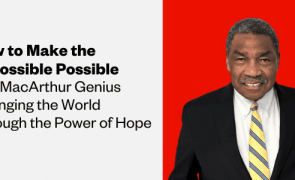How can we protect our mental health during a global pandemic? Emily Esfahani Smith, author of the critically acclaimed The Power of Meaning, argues that the answer lies not in a quest for happiness, but a search for meaning.
“When researchers and clinicians look at who copes well in crisis and even grows through it, it’s not those who focus on pursuing happiness to feel better; it’s those who cultivate an attitude of tragic optimism,” Emily Esfahani Smith writes in her latest op-ed for The New York Times. Coined by psychologist and Holocaust survivor Viktor Frankel, the term refers to an “ability to maintain hope and find meaning in life despite its inescapable pain, loss, and suffering.”
To illustrate the effectiveness of tragic optimism, Smith points to a study conducted after the events of 9/11. In general, people reported higher instances of fear, anxiety, or hopelessness—but the emotions were more debilitating for some than others. “What set those resilient students apart was their ability to find the good. Unlike the less resilient students, the resilient reported experiencing more positive emotions, like love and gratitude,” Smith writes. It didn’t mean they denied horror of the attack, but that they were able to find hope despite it.
Pursuing things that make us happy—whether it be taking time to exercise, or spending time with a loved one—does make us feel better, albeit temporarily. But when it comes to coping, happiness does not penetrate the psyche as deeply as meaning does, Smith notes. “The things that make our lives meaningful, like volunteering or working, are stressful and require effort.” Yet they also inspire and enrich our lives, connecting us to something bigger than ourselves. By searching for meaning and adopting the spirit of tragic optimism, people will be able to actually grow through adversity.
Read her full article here.
To book speaker Emily Esfahani Smith for your next event, contact The Lavin Agency today, her exclusive speakers bureau.















